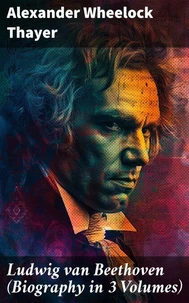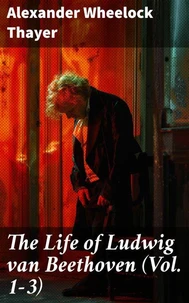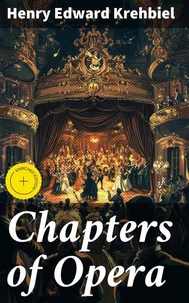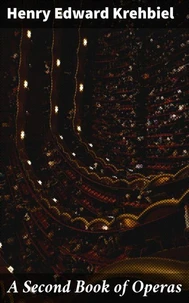Chapters of Opera. Being historical and critical observations and records concerning the lyric drama in New York from its earliest days down to the present time
Par :Formats :
Disponible dans votre compte client Decitre ou Furet du Nord dès validation de votre commande. Le format ePub est :
- Compatible avec une lecture sur My Vivlio (smartphone, tablette, ordinateur)
- Compatible avec une lecture sur liseuses Vivlio
- Pour les liseuses autres que Vivlio, vous devez utiliser le logiciel Adobe Digital Edition. Non compatible avec la lecture sur les liseuses Kindle, Remarkable et Sony
 , qui est-ce ?
, qui est-ce ?Notre partenaire de plateforme de lecture numérique où vous retrouverez l'ensemble de vos ebooks gratuitement
Pour en savoir plus sur nos ebooks, consultez notre aide en ligne ici
- Nombre de pages365
- FormatePub
- ISBN859-65--4720552-4
- EAN8596547205524
- Date de parution04/09/2022
- Protection num.Digital Watermarking
- Taille684 Ko
- Infos supplémentairesepub
- ÉditeurDIGICAT
Résumé
In "Chapters of Opera, " Henry Edward Krehbiel meticulously dissects the evolution of operatic art, offering readers an engaging exploration of its historical and cultural significance. Written in a lyrical yet scholarly style, Krehbiel's prose intertwines analysis with anecdotal narratives, allowing for a comprehensive understanding of opera's development from its nascent forms to its grand productions.
The book's rich context is anchored by Krehbiel's deep appreciation for music as a multifaceted cultural phenomenon, evidenced by his incisive comparisons of different styles and genres, alongside vivid portraits of key figures in opera history. Krehbiel, a prominent music critic and scholar of the late 19th and early 20th centuries, brought a wealth of knowledge to this work, influenced by his involvement in the American music scene and his passion for elevating the opera as an art form.
His previous writings and critiques reflect his commitment to demystifying music and making it accessible to a broader audience, which aligns with his intent in "Chapters of Opera" to not only inform but also inspire a love for this sophisticated genre. This book is highly recommended for anyone seeking to deepen their understanding of opera or who wishes to appreciate the interplay between music and cultural history.
Krehbiel's insightful analysis and engaging narrative style make it an essential read for both scholars and casual enthusiasts alike.
The book's rich context is anchored by Krehbiel's deep appreciation for music as a multifaceted cultural phenomenon, evidenced by his incisive comparisons of different styles and genres, alongside vivid portraits of key figures in opera history. Krehbiel, a prominent music critic and scholar of the late 19th and early 20th centuries, brought a wealth of knowledge to this work, influenced by his involvement in the American music scene and his passion for elevating the opera as an art form.
His previous writings and critiques reflect his commitment to demystifying music and making it accessible to a broader audience, which aligns with his intent in "Chapters of Opera" to not only inform but also inspire a love for this sophisticated genre. This book is highly recommended for anyone seeking to deepen their understanding of opera or who wishes to appreciate the interplay between music and cultural history.
Krehbiel's insightful analysis and engaging narrative style make it an essential read for both scholars and casual enthusiasts alike.
In "Chapters of Opera, " Henry Edward Krehbiel meticulously dissects the evolution of operatic art, offering readers an engaging exploration of its historical and cultural significance. Written in a lyrical yet scholarly style, Krehbiel's prose intertwines analysis with anecdotal narratives, allowing for a comprehensive understanding of opera's development from its nascent forms to its grand productions.
The book's rich context is anchored by Krehbiel's deep appreciation for music as a multifaceted cultural phenomenon, evidenced by his incisive comparisons of different styles and genres, alongside vivid portraits of key figures in opera history. Krehbiel, a prominent music critic and scholar of the late 19th and early 20th centuries, brought a wealth of knowledge to this work, influenced by his involvement in the American music scene and his passion for elevating the opera as an art form.
His previous writings and critiques reflect his commitment to demystifying music and making it accessible to a broader audience, which aligns with his intent in "Chapters of Opera" to not only inform but also inspire a love for this sophisticated genre. This book is highly recommended for anyone seeking to deepen their understanding of opera or who wishes to appreciate the interplay between music and cultural history.
Krehbiel's insightful analysis and engaging narrative style make it an essential read for both scholars and casual enthusiasts alike.
The book's rich context is anchored by Krehbiel's deep appreciation for music as a multifaceted cultural phenomenon, evidenced by his incisive comparisons of different styles and genres, alongside vivid portraits of key figures in opera history. Krehbiel, a prominent music critic and scholar of the late 19th and early 20th centuries, brought a wealth of knowledge to this work, influenced by his involvement in the American music scene and his passion for elevating the opera as an art form.
His previous writings and critiques reflect his commitment to demystifying music and making it accessible to a broader audience, which aligns with his intent in "Chapters of Opera" to not only inform but also inspire a love for this sophisticated genre. This book is highly recommended for anyone seeking to deepen their understanding of opera or who wishes to appreciate the interplay between music and cultural history.
Krehbiel's insightful analysis and engaging narrative style make it an essential read for both scholars and casual enthusiasts alike.






